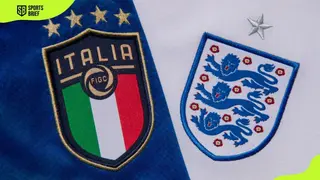Best European Football team: Which is the best European Squad for the upcoming World Cup and why?
Football
Among the most esteemed events in world football is the UEFA European Championship, or the Euros. A tribute to the tradition, passion, and skill of European football, it rises tall. Football fans should know these key facts about the Euro's football history.

The original concept for the European Championships was mooted in the 1950s by Henri Delaunay, the inaugural General Secretary of UEFA. In 1960, France hosted the first tournament, featuring four teams. It has now grown to a 24-team structure.
French football administrator Henri Delaunay had the idea for the UEFA European Championship in the 1920s, but the first took place in 1960. The Soviet Union won the inaugural edition after beating Yugoslavia 2-1 in the final.
There have been innumerable unforgettable moments and fairytales during the Euros. According to Goal, the 1992 edition saw the Danes win the tournament after being called up as a last-minute replacement for Yugoslavia. Greece also stunned the world by winning the 2004 tournament after defeating its host, Portugal.
Best European Football team: Which is the best European Squad for the upcoming World Cup and why?
Football

The evolution of the Euro ball mirrors the broader shifts in football gear and technology, from the early days of using simple leather balls to the modern days of using highly engineered versions. The tournament ball's style and name typically reflect the host nation's cultural background.
The European Football Cup Championship feature the best players in Europe battling to lift their nation to glory. Every football fan should be aware of these essential facts regarding the tournament.
The tournament has grown in size and appeal over the years. The number of teams increased from four in 1960 to eight in 1980, sixteen in 1996, and twenty-four in 2016.
The enlargement, which allowed additional nations to participate, enhanced the tournament's diversity. The European football championship history is full of dramatic moments and underdog stories, thanks primarily to the format revisions, which have added excitement and unpredictability.
Premier League vs La Liga: Which is the best football league and why?
Football
The qualification process has also changed over the years. Hundreds of teams fight in a demanding qualification campaign to participate in the final tournament, up from a handful initially.

Despite not qualifying for the 1992 tournament, Denmark won the trophy as an underdog after replacing Yugoslavia and defeating Germany 2-0 in the final. With a 1-0 final victory over host nation Portugal, Greece shocked the football world in 2004 by becoming the tournament's runner-up.
Germany and Spain are the most successful teams in the European champions, with three titles each. The Germans won in 1972, 1980, and 1996, while the Spaniards lifted the trophy in 1964, 2008, and 2012. Michel Platini holds the record for most goals in a single tournament, scoring nine for France in the 1984 competition.
Which is the best team in FIFA World Cup 2022? Who are the favourites to win it all?
Football
The record for a single match attendance was set in 1964 at the Santiago Bernabéu Stadium in Madrid when 79,115 people watched Spain beat the Soviet Union in the final. The Netherlands' 6-1 quarterfinal victory over Yugoslavia in 2000 was the most significant upset in the tournament.

The winners of previous European football championships are genuinely the sport's elite. France (in 1984 and 2000) and Italy (in 1968 and 2021) are two more prominent winners, alongside Germany and Spain.
Ten national teams have emerged victorious in the 16 editions of the UEFA European Championship. Here is a list of every Euros winner throughout the years.
Country | Year won |
Germany | 1972, 1980, 1996 |
Spain | 1964, 2008, 2012 |
Italy | 1968, 2021 |
France | 1984, 2000 |
Soviet Union | 1960 |
Czechoslovakia | 1976 |
Netherlands | 1988 |
Denmark | 1992 |
Greece | 2004 |
Portugal | 2016 |
The history of the Euros features iconic moments, great players, and significant accomplishments that have made the tournament enjoyable. Here are more facts about the European competition.
Top 10 best soccer jerseys of all time ranked: Find out which is the best looking jersey ever
Football
In 1960, France hosted the first European Championships. The Soviet Union won the tournament after beating Yugoslavia 2-1 in the final.
The competition started with four teams in 1960. It grew from eight teams in 1980 to sixteen in 1996 and twenty-four in 2016. This growth is a direct result of the tournament's rising profile and level of competition.

Germany and Spain are the most successful European teams, with three each.
Michel Platini holds the record for most goals in a single Euros tournament, scoring 9 for France in the 1984 championship.
The highest recorded attendance at a Euros match was 79,115 during the 1964 final in Madrid, where Spain defeated the Soviet Union.
African Cup of Nations winners: A comprehensive list of all past champions to date
Football

Teams compete in a qualification process in the years leading up to the tournament. The qualification process has evolved, with dozens of teams vying for a spot in the final game.
In honour of the tournament's 60th anniversary, Euro 2020 was unlike any other Euro since it took place in eleven nations. At Wembley Stadium, Italy prevailed over England in a penalty shootout to claim victory in the tournament.
The next Euros will be held in Germany in 2024, continuing the tradition of showcasing Europe's top talents. The event runs from 14 June to 14 July 2024.
Euros football history has had many spectacular moments, great players, and incredible accomplishments. Every year, the tournament writes a new chapter in the annals of football in Europe as the rest of the world watches. So, who will win the 2024 edition in Germany?
Italy vs England football: Comparing their football achievements
Football
READ ALSO: UEFA Euro tickets: How much are they and where to find last-minute tickets
Sports Brief revealed details on how to access UEFA Euro tickets. The demand for gate passes keeps growing as Europe gears up for one of its biggest football showdowns. Follow the above link to discover ticket prices and where to access them.